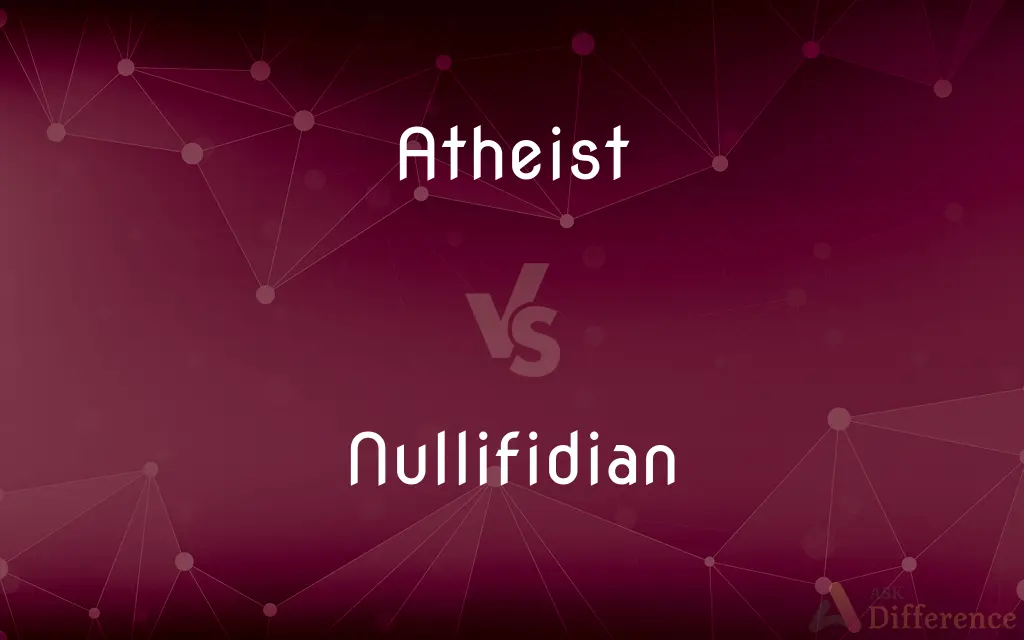Atheist vs. Nullifidian — What's the Difference?
By Tayyaba Rehman & Fiza Rafique — Updated on March 27, 2024
Atheist describes someone who does not believe in the existence of God or gods; nullifidian, a less common term, refers to a person with no faith or beliefs in any religion, emphasizing a broader skepticism.

Difference Between Atheist and Nullifidian
Table of Contents
ADVERTISEMENT
Key Differences
An atheist is an individual who specifically denies or disbelieves in the existence of a deity or deities. Nullifidian, on the other hand, represents a broader category of skepticism that extends beyond the rejection of theism.
While atheism focuses specifically on the disbelief in gods, nullifidianism encompasses a wider range of skepticism, including atheism but also potentially rejecting spiritual, supernatural, or metaphysical beliefs not necessarily tied to a god. Nullifidians might question the existence of anything beyond the empirical world, making their worldview not just atheistic but broadly secular and materialistic.
The difference between atheism and nullifidianism can also be seen in the approach to religious practices and ideologies. Atheists might engage with religious concepts primarily to refute the existence of deities, whereas nullifidians might dismiss all religious practices and beliefs as fundamentally flawed or irrelevant, focusing on a life and morality independent of religious frameworks.
While both atheists and nullifidians share a lack of belief in deities, nullifidianism represents a broader rejection of religious beliefs and practices, embodying a comprehensive skepticism towards all forms of religious faith.
Comparison Chart
Definition
Disbelief in the existence of God or gods.
No faith or belief in any religion.
ADVERTISEMENT
Scope of Skepticism
Specifically targeted at theism.
Broad skepticism towards all religious beliefs.
Commonality
Common term, widely understood.
Less common, more specific to complete skepticism.
Focus
Disbelief in deities.
Rejection of all religious dogmas and beliefs.
Philosophical Stance
Often based on the lack of empirical evidence for gods.
Broadly secular, questioning all beyond the empirical.
Engagement with Religion
May engage to refute theistic claims.
May dismiss all religious practices as irrelevant.
Compare with Definitions
Atheist
A person who does not believe in the existence of deities.
The atheist argued that there was no empirical evidence for gods.
Nullifidian
Someone with no faith in any religious beliefs.
As a nullifidian, he questions all forms of religious faith.
Atheist
Often involved in debates on religion and science.
He identifies as an atheist and frequently participates in scientific debates about religion.
Nullifidian
Rejects all religious dogmas, not just theism.
Her nullifidian stance made her skeptical of spiritual claims as well.
Atheist
Rejects theism but may still engage with religious themes.
The atheist author explored religious myths through a historical lens.
Nullifidian
Focuses on life independent of religious frameworks.
Living as a nullifidian, she bases her morality on secular humanism.
Atheist
Focuses on the empirical and observable world.
Her atheism is grounded in a commitment to empirical evidence and rational thought.
Nullifidian
Emphasizes a life guided by secular principles.
His nullifidian views align with a purely secular understanding of the world.
Atheist
Disbelief in gods based on lack of evidence.
As an atheist, she found the discussions on divine existence unconvincing.
Nullifidian
Broad skepticism towards the supernatural.
Nullifidians often dismiss supernatural explanations as lacking empirical support.
Atheist
Disbelief in or denial of the existence of God or gods.
Nullifidian
A sceptic; an atheist or unbeliever.
Atheist
(religion) A person who does not believe in deities.
Nullifidian
Of no faith or religion; not trusting to faith for salvation.
Atheist
(narrowly) A person who believes that no deities exist one who has no other religious belief.
Nullifidian
Of no faith; also, not trusting to faith for salvation; - opposed to solifidian.
Atheist
(broadly) A person who rejects belief that any deities exist (whether or not that person believes that deities do not exist).
Nullifidian
An unbeliever.
Atheist
(loosely) A person who has no belief in any deities, such as a person who has no concept of deities.
Atheist
(uncommon) A person who does not believe in a particular deity (or any deity in a particular pantheon), notwithstanding that they may believe in another deity.
Atheist
(proscribed) A person who does not believe in any religion (not even a religion without gods)
Atheist
Of or relating to atheists or atheism; atheistic.
Atheist
To make someone an atheist.
Atheist
One who disbelieves or denies the existence of a God, or supreme intelligent Being.
Atheist
A godless person.
Atheist
Someone who denies the existence of god
Atheist
Related to or characterized by or given to atheism;
Atheist leanings
Common Curiosities
Why might someone identify as a nullifidian rather than an atheist?
Someone might identify as a nullifidian to emphasize their broad skepticism towards all religious beliefs, beyond just the disbelief in gods.
What does it mean to be an atheist?
Being an atheist means disbelieving in the existence of gods, often due to a lack of empirical evidence.
Can someone be both an atheist and a nullifidian?
Yes, an atheist can also be a nullifidian if they reject all religious beliefs, not just the belief in deities.
How do atheists and nullifidians view religious practices?
Atheists might specifically critique the belief in gods, while nullifidians generally dismiss all religious practices as irrelevant to their understanding of the world.
Is nullifidianism more encompassing than atheism?
Yes, nullifidianism encompasses a wider range of skepticism, including atheism but also rejecting other religious and spiritual beliefs.
What role does debate play for atheists and nullifidians?
Debate can be a significant aspect of atheism and nullifidianism, as individuals often engage in discussions about the evidence for and against religious claims.
Can nullifidians participate in religious traditions?
While nullifidians reject religious beliefs, some may still partake in cultural or family traditions without endorsing the religious aspects.
How is atheism perceived in various cultures?
Perceptions of atheism vary widely, from acceptance in secular societies to stigma or hostility in highly religious communities.
How do atheism and nullifidianism differ in philosophical stance?
Atheism focuses on the non-belief in deities, often due to scientific skepticism, while nullifidianism adopts a broader secular and materialistic viewpoint, questioning all religious and metaphysical claims.
What drives someone to nullifidianism?
A commitment to empirical evidence, rational thought, and a skepticism of anything beyond the observable world can drive someone to nullifidianism.
Share Your Discovery

Previous Comparison
Town vs. Burg
Next Comparison
Harass vs. HarasAuthor Spotlight
Written by
Tayyaba RehmanTayyaba Rehman is a distinguished writer, currently serving as a primary contributor to askdifference.com. As a researcher in semantics and etymology, Tayyaba's passion for the complexity of languages and their distinctions has found a perfect home on the platform. Tayyaba delves into the intricacies of language, distinguishing between commonly confused words and phrases, thereby providing clarity for readers worldwide.
Co-written by
Fiza RafiqueFiza Rafique is a skilled content writer at AskDifference.com, where she meticulously refines and enhances written pieces. Drawing from her vast editorial expertise, Fiza ensures clarity, accuracy, and precision in every article. Passionate about language, she continually seeks to elevate the quality of content for readers worldwide.














































